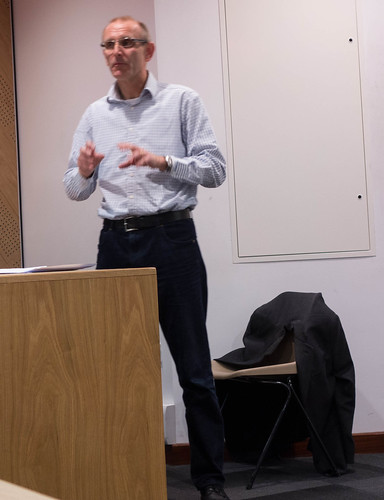David Clark from Cuba Entertainment on Unlocking your Dream
 Wednesday, November 13, 2013 at 10:36PM
Wednesday, November 13, 2013 at 10:36PM
Today’s Rather Useful Seminar followed on nicely from the one last week, about steps to take to get your game out there. Except that this was the view from the other side of the street. David Clark of Cuba Entertainment has been in the gaming business since the early nineties working with such companies as Stainless Games, SCI, Eidos and Sega. He has seen the rise and fall of the cartridge based console, the disruption caused by the PlayStation 1 when Sony released it on an unsuspecting world, and most recently the shattering effect of the arrival of Apple and the App. Store on game distribution.
He has also seen the influence of the game publisher wax and wane and the rise of the self publishing game house. David was here to tell us how you can take your great software and make it into successful product. He had some very interesting things to say about money, where to get it from, what do do with it and the importance of an exit strategy.
Two things stood out from his talk for me. Firstly that 60% of something is an awful lot more than 100% of nothing. The value that publishing services can give to a game are well worth the cost. You might think that you can promote and sell your game yourself, but unless you got into game development to do just that, you are not going to enjoy it very much, and besides you should really be spending your time adding value to your product, not trying to persuade people to buy it. Much better to let go of some of the equity and use it to pay for people who can get things moving for you.
The second thing that stood out (and I was very pleased to hear this from David) was the importance of Networking. And no, I don’t mean WiFi. I mean having business cards, making useful friends and keeping people informed of what you are about. The kind of funding that a fledgling game developer needs is just the kind of stuff you can get from folks you happen to know who have spare cash lying around. So you need to make efforts to “happen to know” them. This means getting out there and promoting yourself, which is spectacularly difficult for an introverted computer scientist, but it is well worth the effort.
Thanks so much to David for coming along and giving us the benefit of his experience and knowledge.
You can find his presentation slide deck here.
 Rob |
Rob |  Post a Comment |
Post a Comment | 
Reader Comments